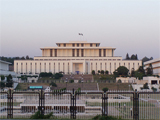Domestic Discontent
14 Oct 2009
By Philip McCrum for ISN
A year ago, Asif Ali Zardari was sworn in the 13th president of Pakistan. His party, the Pakistan People’s Party (PPP), won an unprecedented two-thirds majority in parliament and secured three of the country’s four provinces. The scale of his victory was chiefly a reaction against the decade-long rule of his predecessor, General Pervez Musharraf, who had attracted deep and widespread public opprobrium by the end of his tenure. Nevertheless, the election gave Zardari a sweeping mandate, imbuing the country with newfound political optimism. For a fleeting moment, he was even able to find common ground with his arch political enemy, the Pakistan Muslim League (PML -N) under Nawaz Sharif, with the aim of removing Musharraf from office.
A year on, this has all but dissipated. A recent poll conducted by the Pew Research Centre showed that Zardari’s popularity rating had slumped from 64 percent to 32 percent, with his political rival Sharif, garnering an approval rating of 79 percent.
To be fair, Zardari inherited myriad problems, which had built up under Musharraf’s rule and which he had abjectly failed to address. Years of economic mismanagement left Pakistan badly exposed to the global economic downturn, which turned nasty just as Zardari assumed power. Musharraf also left a legacy of poorly maintained infrastructure, which has crippled much of the country with power shortages. To make matters worse, Musharraf dismissed the country’s former chief justice, Iftikhar Chaudhry, as well as numerous other judges, just prior to his own departure, bequeathing deeply embedded political instability.
But Zardari has also dug his own holes. His credibility rapidly diminished when he initially failed to restore Chaudry and other members of the judiciary to their former posts, as he had earlier pledged. This deepened the rift between him and the PML-N, which holds the second-largest number of seats in parliament. Relations deteriorated further over Zardari’s refusal to honor another of his campaign pledges, which was to scrap the 17th amendment to the constitution. Implemented by Musharraf, it gives the presidency wide-ranging powers, including the power to dismiss all or any of the central or provincial governments and parliaments.
And this he effectively did when, at his bidding in February, the Supreme Court issued a ruling that Sharif and his brother Shahbaz, the elected chief minister of Punjab province, were ineligible to hold public office. As a result of the ruling, the PML-N was effectively ejected from government in the Punjab, and the provincial parliament dissolved, causing widespread rioting throughout the province.
Zardari’s application of these highly controversial presidential powers was seen as a brazen move to consolidate power in his own hands. The timing of his campaign against Sharif was also ill-judged, as it took place when security in the country was worsening and the economy faltering. The public was not prepared to forgive him for putting personality politics before the needs of the country; as a result, his public approval ratings fell rapidly.
Tapping onto the growing public discontent with the government, the PML-N gave its backing to an anti-government march orchestrated by lawyers seeking Chaudry’s reinstatement. When repressive measures adopted by the government, including placing Sharif under house arrest and detaining hundreds of protesters, merely fanned the flames of discontent, Zardari finally backed down and reinstated Chaudry. The Supreme Court restored provincial rule in the Punjab, ruling that Shahbaz Sharif also be restored as chief minister.
These developments not only undermined Zardari’s political credibility and his public standing but also his authority within his own party. PPP members became increasingly concerned that Zardari had not simply squandered the party’s mandate, but had also inadvertently boosted support for Sharif. Mutterings within his party suggest that maintaining his position as president and head of the party for his full five-year term is not a foregone conclusion.
Given his parliamentary majority, it will be very difficult to unseat Zardari mid-term, since it would require a two-thirds majority to do so. But politics in Pakistan is not always conducted constitutionally. Although their power waned significantly with the ousting of Musharraf, the military hierarchy remains a political force with which to be reckoned. Indeed, their authority has recently waxed once more; military gains in the Swat valley against the Taliban in recent weeks have recharged the confidence of the military leaders. Zardari has not even been able to claim these military successes for himself; as far as the Pakistani public is concerned, economic well-being is far more of a priority than terrorism and security, and in that respect he has so far failed to deliver.
Zardari’s problem is that he has never been able to shake off the widespread belief that he fell into his position by default; that he only assumed the leadership of the PPP because of the death of his wife, Benazir Bhutto. In these exceptional circumstances, putting together a coalition with the likes of Jamiat-e Ulema-e Islam-Fazlur, the Pashtun Awami National Party and the Karachi-based Muttahida Qaumi Movement with the PPP was relatively straightforward, but has since proved to be increasingly difficult to hold together.
Consequently, many in Pakistan - and increasingly so within his party - see him as less of a leader and more of a stand-in, merely filling time. In that respect, his days are surely numbered; he has completed one year in office, but there is a good chance he won’t last another. Caught between an increasingly popular Sharif; a resurgent military; and growing dissent within his own camp, Zardari faces a tough struggle for his political survival.

